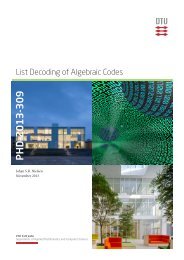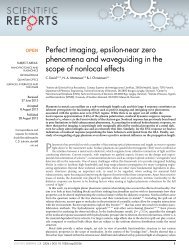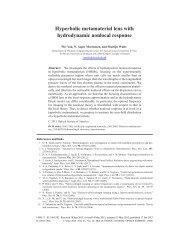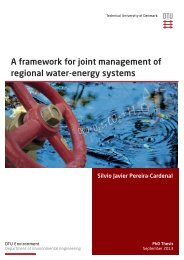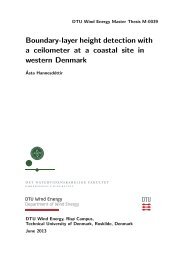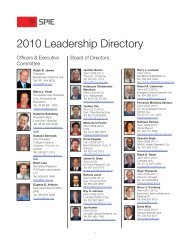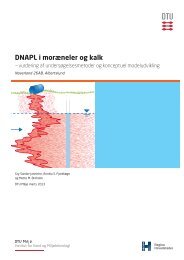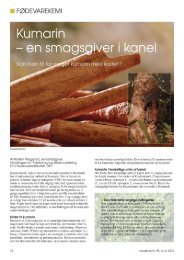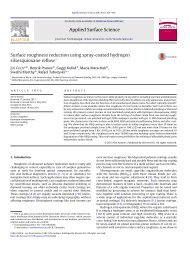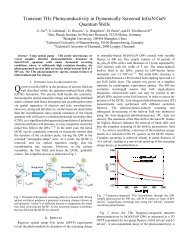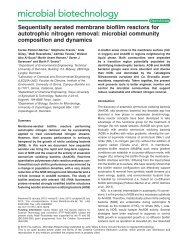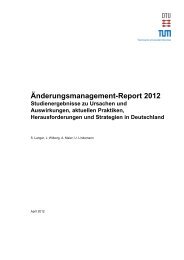PEC12-25 CAPEC-PROCESS Industrial Consortium ... - DTU Orbit
PEC12-25 CAPEC-PROCESS Industrial Consortium ... - DTU Orbit
PEC12-25 CAPEC-PROCESS Industrial Consortium ... - DTU Orbit
Create successful ePaper yourself
Turn your PDF publications into a flip-book with our unique Google optimized e-Paper software.
• Research Program D - Process Control, Operation & Monitoring: deals with the<br />
development of use of systematic algorithms, methods and tools for process<br />
control, operation and monitoring, including process analytical technologies.<br />
Techniques for tuning of controller parameters in model predictive control and<br />
methods for design of PAT systems are some of the highlights of program D.<br />
• Research Program E - Process and Tools Integration: deals with on-line (process)<br />
and off-line (tools) integration as well as safety & hazards, sustainability analysis,<br />
and integration of process design-control, process-product design and processprocess.<br />
Integrated software such as ICAS, virtual process-product design lab,<br />
SustainPro and their associated methodologies are some of the highlights of<br />
program E.<br />
• Research Program F - Database and Numerical methods: since the <strong>CAPEC</strong>-<br />
<strong>PROCESS</strong> software needs to be self-sufficient in all respects for use by the<br />
industrial consortium companies, <strong>CAPEC</strong> also maintains a library of numerical<br />
methods and databases (properties of chemicals and solvents, reaction synthesis,<br />
membranes, and analysis equipments). The other research programs benefit from<br />
this in terms of data for modelling and improved simulation strategies.<br />
Based on the above, the research objectives of <strong>CAPEC</strong> is summarized as:<br />
Develop computer-aided systems for efficient and reliable process simulation; for<br />
systematic synthesis, design and analysis of sustainable chemical products and their<br />
manufacturing processes; for robust control, operation and monitoring of processes<br />
from principally chemical, petrochemical, pharmaceutical and biochemical<br />
industries. The computer-aided systems are to be developed based on fundamental<br />
and/or data-based modelling studies that incorporate correlation and estimation of<br />
thermo-physical and phase equilibrium properties as well as modelling the<br />
underlying principles / behaviour of the process-product. That is, by managing the<br />
complexity in a systematic and efficient manner.<br />
<strong>CAPEC</strong>’s research is focused - while the application horizon is wide (oil and gas,<br />
petrochemical, chemical and specialty chemical, pharmaceutical, food and bio industrial<br />
sectors) the focus is on the use of a systems approach. <strong>CAPEC</strong>’s strengths in terms of its<br />
research focus - pioneering work in certain research areas (such as modelling; methods<br />
for synthesis, design and analysis of process as well as products; process and tools<br />
integration), industrial collaboration (dissemination of research results through the<br />
industrial consortium as well as collaboration with academia), and contacts (ability to<br />
influence developments within chemical engineering and CAPE/PSE). More specifically,<br />
<strong>CAPEC</strong>’s contribution in the areas of thermodynamic property modelling for processproduct<br />
design; computer-aided molecular-mixture design for consumer product<br />
development; targeted reverse approach for process intensification and integration;<br />
systematic computer-aided methods and tools for modelling, design, analysis and control<br />
are well known within the CAPE/PSE community.<br />
Through the industrial consortium, <strong>CAPEC</strong> co-workers have the unique opportunity to<br />
get quick and useful feedback on their developed models, methods and tools as well as<br />
insights to the current and future needs of the various industrial sectors represented by the<br />
consortium members.<br />
The dissemination of the research results of <strong>CAPEC</strong> is carried out in terms of:<br />
6



